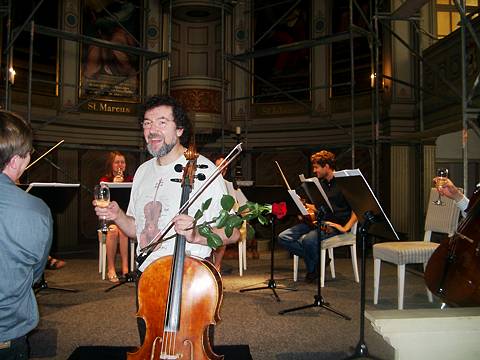|
<< -- 4 -- Tess Crebbin ONE YEAR ON

TC: You were in Kronberg together as well, weren't you?
LV: We played the Brahms sonata together in Kronberg, actually, as a preparation for the Heimbach recording that we got the 2004 Echo for. This was our last collaboration, actually. It was the last time we worked together.
TKV: And the last time Boris played on stage there was actually on Lars's birthday. Boris started playing a long cadenza and the audience sat shocked wondering what he was going to do and then he launched into Happy Birthday for Lars. It was so sweet to do this, and he really had wanted to do it for Lars, as a birthday surprise for him.
TC: I am interested in Boris's skills in the piano. He was a very accomplished pianist, wasn't he?
LV: Absolutely. This made it very nice for me because rehearsals with him were always very comprehensive. He knew enough about my instrument to be able to say to me: 'why don't you play the legato like that' or: 'imagine how Pavel would do this'. I remember for example when we played the Tchaikovsky Trio in Israel when we came to the point of a very easy theme that is followed by all sorts of variations. I played it rather dancy at first and so he said: 'You know, I heard it once in concert, I think with Pavel playing, and he played it completely out of time.' I always think about that when I play it now and I have started going into that direction myself. Sort of always listening for what you have just played. There were so many of his own experiences that always came into rehearsal, and he also played very well himself and was capable of sitting down at the piano to play a passage or two.
TC: He was also a very good composer, wasn't he?
TKV: Yes, true. I understand that his composition professor at the time, in St Petersburg, advised Boris to become a professional composer because he had the necessary talent. But he chose to go the other way and become a cellist instead. However, some of his compositions survive and maybe one day we will get to know them. I am sure it was probably very interesting work that he produced in his early days and as a composer I am naturally curious to find out about it. I understand that there are a lot of completed works, even opera. But he didn't want it performed because he thought it was not good. I am trying to remember what his opera was about ... some sarcastic subject, I believe.
LV: What you have to understand about Boris is that he was always very thorough about his work. When we were rehearsing together and we others (Tetzlaff and me, for instance) felt that the rehearsal was just drawing out too long, we would say: okay, we are going to cut the time down a bit. But Boris would call us and say that we really need to put the time into this and he would give us a pep talk to get us back to practice, saying things like: 'you can't just go on stage like that.'
TC: At Heimbach, things had to move rather quickly, though?
LV: Yes, there was this occasion when Christian Tetzlaff wanted to play one of the last Beethoven string quartets. So we performed this fantastic string quartet but it was actually only put together at Heimbach and we rehearsed well into the night that time. We rehearsed every spare minute. And I think before Heimbach one wouldn't have imagined him saying yes to something like that: putting together a piece at short notice. But he did it and he was very happy to be part of this process, although it left all of us exhausted.
TKV: But one mustn't forget that he also had problems as the result of his chemotherapy, which made him very tired.
TC: But he was still teaching ...
TKV: Yes, he was a very positive person. He just kept going, even when the odds turned against him. He had this wonderful attitude where when one door closed for him he looked around to find the other door that had opened and walked through it. So when he could no longer play because of the chemotherapy and the operations, he just concentrated on teaching. And when he could no longer go to school to teach, he brought his students to him in hospital and he taught from his hospital room. He always looked at whatever he still had left, not what he had lost.
LV: I really admired him for that. In hindsight it was really odd that all his life he was always pretty scared of all sorts of illness. He would get a cold and be scared that it could be something serious, and we all smiled about that. But then, when he got really seriously ill, he was so very strong in dealing with it. You never saw him weak or in despair. It seemed so honest, the strength that he displayed toward dealing with his illness. The smile and the hospitality that he had all his life were something that did not leave him.

A life dedicated to the cello: Boris Pergamenschikow. Photo © Tanya Pergamenschikow
|
TC: Many people say that he was someone of impeccable integrity. Is that true?
LV: Yes absolutely. He had a great sense of justice and for being polite to people. He also thought that we should really focus on the time we have and spend it with people who warrant it. This same approach went for his music: play with people who get something out of this and don't just do it for money. It was important for him that the people he played with had the right attitude as well, and that they really loved music.
| 
